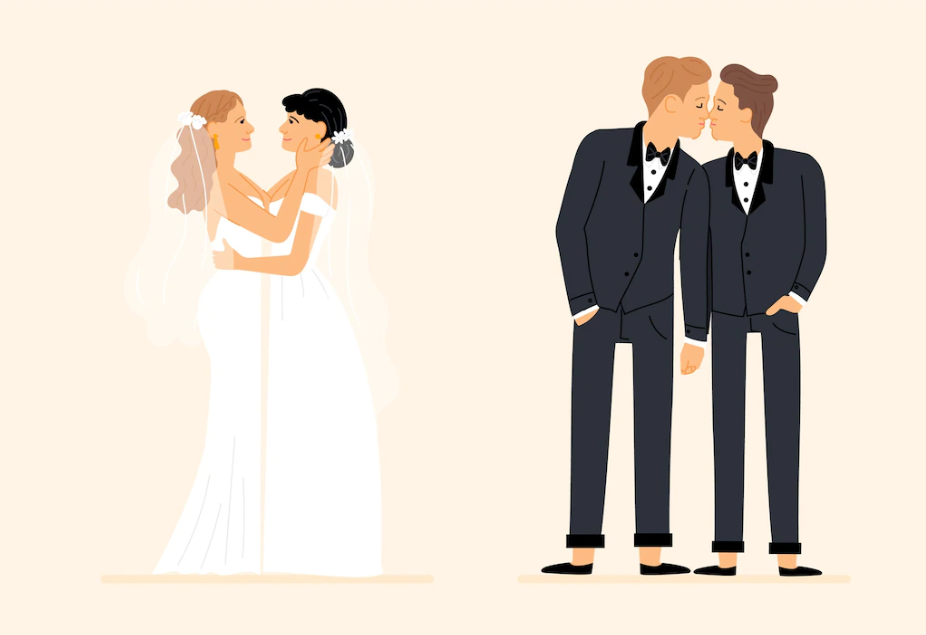News Highlight
A SC bench consisting of the CJI issued a notice seeking a response to Same-sex marriage under the Special Marriage Act, (SMA) 1954.
Key Takeaway
- It was based on a response to two petitions filed by gay couples to allow the solemnisation of samesex marriage.
What is Same Sex Marriage?
- Same-sex marriage is the marriage of two people of the same sex or gender.
The Special Marriage Act (SMA) 1954
- About
- The SMA provides a civil form of marriage for couples who cannot marry under their law.
- Aim
- The Act’s primary purpose was to amend and codify the law relating to marriage among Hindus and others.
- This Act applies
- To any person who is a Hindu by religion in any of its forms or developments, including a Virashaiva, a Lingayat or a follower of the Brahmo, Prarthana or Arya Samaj.
- To any person who is a Buddhist, Jain or Sikh by religion.
- To any other person domiciled in the territories to which this Act extends who is not a Muslim, Christian, Parsi or Jew by religion unless it is proved that any such person would not have been governed by the Hindu law or by any custom or usage as part of that law in respect of any of the matters dealt with herein if this Act had not been passed.
What is the government’s stand?
- Neither recognised nor accepted.
- Late last year, while responding to the pleas seeking recognition of samesex marriages in the Delhi High Court, Solicitor General for the Centre had said that as per the law, marriage was permissible between a “biological man” and “biological woman”.
- In its affidavit opposing the pleas, the Centre had said: “The acceptance of the institution of marriage between two individuals of the same gender is neither recognised nor accepted in any uncodified personal laws or any codified statutory laws”.
Arguments in Favour
- Violation of the Fundamental Rights
- Articles 15 and 16 of the Indian Constitution prohibit discrimination based on gender, but these rights are often violated in society.
- Consensual homosexual sex is no more a crime.
- In 2018 (Navtej Johar vs Union of India), the Supreme Court overturned a previous judgment and ruled that consensual homosexual sex was not a criminal offence. However, same-sex marriages are yet to be recognised in the country.
- Violation of the right to equality
- The prohibition of the marriage of LGBT people based on sexual orientation and gender identity was absolute discrimination towards them and also violative of the right to equality as granted by the Constitution.
- Global scenario
- A total of 32 countries around the world have legalised samesex marriages.
- Lack of benefits
- Many benefits would otherwise be available to heterosexual married couples that are not available to them.
Arguments against
- Not Codified
- Marriage between two individuals of the same gender is “neither recognised nor accepted in any uncodified personal law or codified statutory law”.
- The issue with Personal Laws
- Any interference with the existing marriage laws would cause complete havoc with the country’s delicate balance of personal laws.
- No Fundamental Right to same-sex marriage
- Supreme Court judgment in the Navtej Singh Johar case “does not extend the right to privacy to include a fundamental right like a right to marry by two individuals of the same gender”.
- Religious texts and sentimental values
- Marriages in societies are very much part of their religion and are derived and associated with their divine entities and religious texts, thereby holding significant sentimental values.
- Societal Morality
- There exists a “legitimate State interest” in limiting marriage recognition to persons of the opposite sex.
Way forward
- Set a commission
- The government should take action to set up a commission to study all sides of same-sex marriage and take adequate measures.
- Registration under secular laws
- Such marriages should either be registered under secular law like Special Marriage Act or must be allowed under all religious laws such as Muslim Marriage Law and Sikhs’ Anand Marriage Act, and it must be made religion-neutral.
- Change for all
- Any “change in marriage procedures” must either be applied to all citizens, “irrespective of faith”, or be restricted to only those forms of marriages that are considered a “civil contract” and not a “religious ritual”.
Content Source: The Hindu



